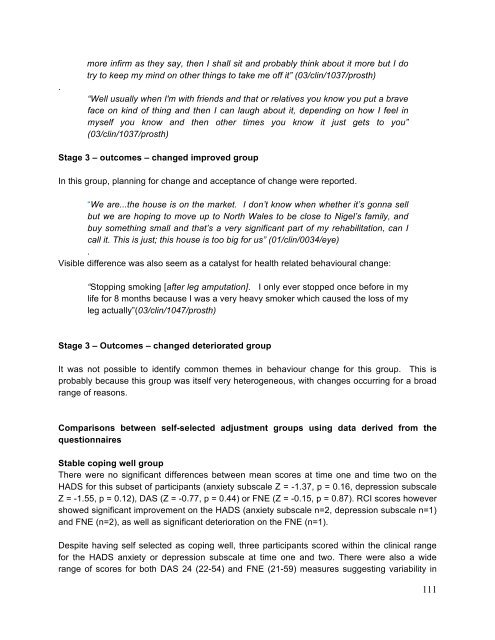Download the report - The Healing Foundation
Download the report - The Healing Foundation
Download the report - The Healing Foundation
Create successful ePaper yourself
Turn your PDF publications into a flip-book with our unique Google optimized e-Paper software.
.<br />
more infirm as <strong>the</strong>y say, <strong>the</strong>n I shall sit and probably think about it more but I do<br />
try to keep my mind on o<strong>the</strong>r things to take me off it” (03/clin/1037/prosth)<br />
“Well usually when I'm with friends and that or relatives you know you put a brave<br />
face on kind of thing and <strong>the</strong>n I can laugh about it, depending on how I feel in<br />
myself you know and <strong>the</strong>n o<strong>the</strong>r times you know it just gets to you”<br />
(03/clin/1037/prosth)<br />
Stage 3 – outcomes – changed improved group<br />
In this group, planning for change and acceptance of change were <strong>report</strong>ed.<br />
“We are...<strong>the</strong> house is on <strong>the</strong> market. I don’t know when whe<strong>the</strong>r it’s gonna sell<br />
but we are hoping to move up to North Wales to be close to Nigel’s family, and<br />
buy something small and that’s a very significant part of my rehabilitation, can I<br />
call it. This is just; this house is too big for us” (01/clin/0034/eye)<br />
.<br />
Visible difference was also seem as a catalyst for health related behavioural change:<br />
“Stopping smoking [after leg amputation]. I only ever stopped once before in my<br />
life for 8 months because I was a very heavy smoker which caused <strong>the</strong> loss of my<br />
leg actually”(03/clin/1047/prosth)<br />
Stage 3 – Outcomes – changed deteriorated group<br />
It was not possible to identify common <strong>the</strong>mes in behaviour change for this group. This is<br />
probably because this group was itself very heterogeneous, with changes occurring for a broad<br />
range of reasons.<br />
Comparisons between self-selected adjustment groups using data derived from <strong>the</strong><br />
questionnaires<br />
Stable coping well group<br />
<strong>The</strong>re were no significant differences between mean scores at time one and time two on <strong>the</strong><br />
HADS for this subset of participants (anxiety subscale Z = -1.37, p = 0.16, depression subscale<br />
Z = -1.55, p = 0.12), DAS (Z = -0.77, p = 0.44) or FNE (Z = -0.15, p = 0.87). RCI scores however<br />
showed significant improvement on <strong>the</strong> HADS (anxiety subscale n=2, depression subscale n=1)<br />
and FNE (n=2), as well as significant deterioration on <strong>the</strong> FNE (n=1).<br />
Despite having self selected as coping well, three participants scored within <strong>the</strong> clinical range<br />
for <strong>the</strong> HADS anxiety or depression subscale at time one and two. <strong>The</strong>re were also a wide<br />
range of scores for both DAS 24 (22-54) and FNE (21-59) measures suggesting variability in<br />
111


